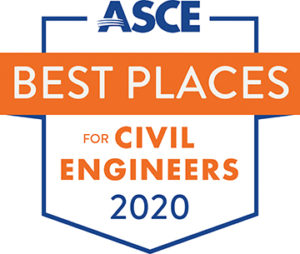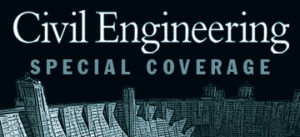ASCE’s Civil Engineering magazine published the feature article “Best Places for Civil Engineers 2020,” which appears in the April issue, before the widespread outbreak of COVID-19 and the subsequently declared pandemic in the United States. Since then, the health and safety of civil engineers and their families; the conditions at engineering firm offices, public agencies, and jobsites; and the overall market for civil works projects have all entered an unprecedented phase of uncertainty.
In some jurisdictions—the city of Boston and the state of Pennsylvania, for example—essentially all construction projects, including work on bridges and highways, have been shut down. Elsewhere, civil works overall might continue, but—as in a recent Iowa bridge project—specific efforts are being suspended, at least temporarily, if even one worker tests positive for COVID-19.
Civil Engineering reached out to the engineers who had been interviewed in the three leading “Best Places” cities—Houston, Los Angeles, and Denver—for updates on how they, their colleagues, and their regions were coping with life and work during the current crisis.
Before the pandemic, the outlook for civil engineering projects in Houston had been booming, notes Julia P. Clarke, P.E., M.ASCE, a senior geotechnical manager at Raba-Kistner Consultants Inc. and the 2019–2020 president of ASCE’s Houston branch. For the moment, Clarke is still working in her regular office because infrastructure-related projects, especially in transportation, are considered essential business in Houston and are exempt from stay-at-home orders (though some colleagues are voluntarily working from home, she adds). As for what the future demand for civil works in her region might be, Clarke is not prepared to speculate other than to explain that some people “are on pins and needles.”
In Los Angeles, all of the Bureau of Engineering’s 238 active construction projects were continuing as of late March, reports Gary Lee Moore, P.E., ENV SP, M.ASCE, the city engineer. Most of the bureau’s staff is able to telecommute and can still go out into the field, he adds. Moreover, because the bureau has for several years been conducting development services, such as permit applications, online, the staff was able to quickly transition and eliminate all in-person transactions. As of March 23, all services were being delivered via online applications and email or by dropping off materials for processing at specially designated drop boxes, Moore explains.
Adam Phipps, P.E., the deputy city engineer in Denver’s Department of Transportation and Infrastructure, was not available to respond to questions related to COVID-19 and civil works projects. But the city’s Joint Information Center replied that “Denver is still in business as usual, following all guidelines from the [Centers for Disease Control and Prevention] on all jobsites.”
The other engineers interviewed for the “Best Places” article were unavailable for comment. Civil Engineering will report on these and other developments as they unfold.





Absorbing the trying times faced by Americans.
Time to ponder more on the values that we as Civil Engineers might have to stand for, during and after this pandemic:
> Human empathy for human Life Loss
> Ensure and arrange for Food and resettlement for the needy
> Share, and donate for less privileged through working Organizations, Volunteer Groups.
> Change our ways of Working- more faith on Contractors, increased role of Independent Engineers.
> New Systems for better cost efficient and sustainable Human settlements, mminimum load on carbon footprint.
Best Wishes and live while conserving natural resources, respect for Flora and fauna, animal kingdom.
JS Sondhi fmr Addl Dir General- Railway research and Project management roles